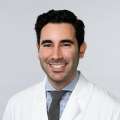When a 7.8-magnitude earthquake struck southern Turkey and western Syria on February 6, killing tens of thousands of people and leaving hundreds of thousands displaced, it hit close to home for members of the UCLA community with friends and family in the region.
Within a day of the horrific quake, a group of students in the David Geffen School of Medicine at UCLA, faculty and staff rallied to put together a relief effort to send supplies to help those in need. Founding members of the student-led Arab Health Organization (AHO) reached out to their advisors, Faysal Saab, MD ’12 (RES ’16), assistant clinical professor of internal medicine and pediatrics, and Neveen S. El-Farra, MD (RES ’05), professor of clinical medicine, to spearhead a humanitarian response for the area.
For many of those who participated, the effort was deeply personal.
“Getting messages and calls of distress from those closest to me really woke me up,” says Al-Hassan Dajani, a first-year medical student and a founding member of the AHO. Some of Dajani’s closest friends are Syrian refugees from the decade-long war that has consumed their homeland.
“We have a lot of members of the Syrian community at UCLA, and they are going through a very hard time,” Dajani says. “For us, it was important to fulfill our duty to respond, both by initiating action and by being a source of support for those around us.”

Fourth-year medical student Zina Jawadi is also a founding member of the AHO. “It was important that our voices be heard,” she says, recalling that the group’s advisors and UCLA Health had been involved in donating medical equipment to Beirut, Lebanon, after a massive explosion in the port devastated the city in 2020. “We wanted to know if it was possible for us to do something similar to the Beirut humanitarian relief. It took off from there.”
Dr. Saab was on a global-health trip in Jordan, when the earthquake hit, and he soon started receiving emails from students. “I went straight to leadership at UCLA Health who were so kind and gracious a few years ago in sending relief after the Beirut blast,” he recalls.
His request for help moved up the chain, and once leadership in UCLA Health signed off, the effort began in earnest.
“As a mother and health care provider, I knew that we had to act,” says Rana Al Rasheed, BDS, a faculty member in the UCLA School of Dentistry. “Watching the images on the news and hearing the stories of the suffering, I was heartbroken. But I'm not someone who sits and wallows.”
The day after the earthquake, she sent a group text to AHO students, who already were working behind the scenes to launch a relief effort: “We are the helpers. What can we do?”
The students responded that they wanted to send medical supplies abroad.
In this regard, Dr. Al Rasheed had crucial connections — friends with contacts in the Turkish consulate, where donations were being collected to be flown by Turkish Airlines, and the Turkish embassy.
Soon plans began to formalize. The health care logistics team in the UCLA Health General Services Department, the UCLA Health Office of Community and the Medical Aid Initiative, a student-run group operating in partnership with UCLA Health to provide resources to global-health organizations, prepared 24 pallets of medical supplies and care items — isolation gowns and carts, breathing circuits, thermal blankets, gloves, diapers, safety goggles, stethoscopes, syringes and hand sanitizer — to send to Turkey and Syria, with a second shipment of gurneys, cots and IV poles to follow.
“This is what health care is about,” says Michael Baca, director of health care logistics. “It’s about the patients, whether they are here or 7,000 miles away in Turkey and Syria. Our mission is to heal humankind. That one patient who needs to be healed can be anywhere.”

Next came Operation Turkish and Syrian Relief: Warmth and Comfort Drive, to collect urgently needed blankets, tents and sleeping bags for the hundreds of thousands of people now without shelter in the freezing cold. Over the course of several days, some 3,300 items were gathered at Ronald Reagan UCLA Medical Center, UCLA Santa Monica Medical Center, Geffen Hall and a distribution facility in the San Fernando Valley.
Ahmed Kassem was among the volunteers who joined the effort. A child of Jordanian and Syrian parents, he says he felt a duty to participate. “I’m trying to understand the struggle that people from the other side of the world are experiencing,” he says. “They may not be physically close to us, but if we can empathize with their stories, we will feel close to them and begin to understand what they are going through.”
It is important for UCLA Health to be engaged at times like this, says Mike Burke, chief of UCLA Health Patient Navigation and Business Services. “Supporting high-priority humanitarian efforts is something we've done for many, many years. To mobilize an effort that brings together internal and external teams, undergraduate students, medical students and the many people who represent the global community that is UCLA unifies us. It is priceless.”
For fourth-year medical student Ghadi Ghanem, the drive isn’t dissimilar to work he has done with the Student Run Homeless Clinic. “This drive is born out of humanitarian need,” he says. “UCLA health has been instrumental in spearheading an effort to deliver medical supplies and basic needs such as blankets and sleeping bags and tents for those who have been left without shelter. It is inspiring to see UCLA take this grand step and present itself on a global scale.”





